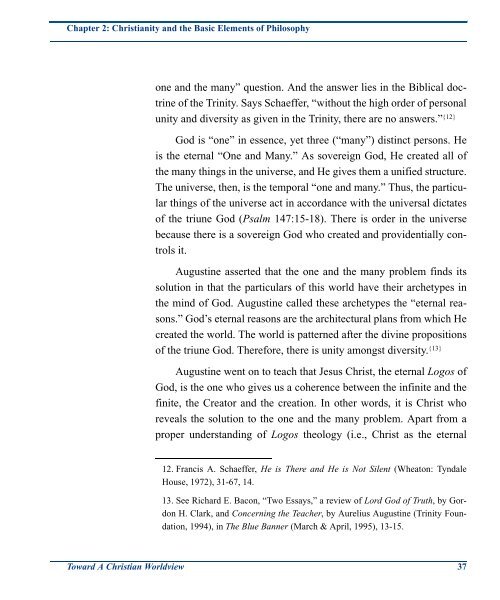Toward A Christian Worldview - Faith Presbyterian Church Reformed
Toward A Christian Worldview - Faith Presbyterian Church Reformed
Toward A Christian Worldview - Faith Presbyterian Church Reformed
Create successful ePaper yourself
Turn your PDF publications into a flip-book with our unique Google optimized e-Paper software.
Chapter 2: <strong>Christian</strong>ity and the Basic Elements of Philosophy<br />
one and the many” question. And the answer lies in the Biblical doctrine<br />
of the Trinity. Says Schaeffer, “without the high order of personal<br />
unity and diversity as given in the Trinity, there are no answers.” {12}<br />
God is “one” in essence, yet three (“many”) distinct persons. He<br />
is the eternal “One and Many.” As sovereign God, He created all of<br />
the many things in the universe, and He gives them a unified structure.<br />
The universe, then, is the temporal “one and many.” Thus, the particular<br />
things of the universe act in accordance with the universal dictates<br />
of the triune God (Psalm 147:15-18). There is order in the universe<br />
because there is a sovereign God who created and providentially controls<br />
it.<br />
Augustine asserted that the one and the many problem finds its<br />
solution in that the particulars of this world have their archetypes in<br />
the mind of God. Augustine called these archetypes the “eternal reasons.”<br />
God’s eternal reasons are the architectural plans from which He<br />
created the world. The world is patterned after the divine propositions<br />
of the triune God. Therefore, there is unity amongst diversity. {13}<br />
Augustine went on to teach that Jesus Christ, the eternal Logos of<br />
God, is the one who gives us a coherence between the infinite and the<br />
finite, the Creator and the creation. In other words, it is Christ who<br />
reveals the solution to the one and the many problem. Apart from a<br />
proper understanding of Logos theology (i.e., Christ as the eternal<br />
12. Francis A. Schaeffer, He is There and He is Not Silent (Wheaton: Tyndale<br />
House, 1972), 31-67, 14.<br />
13. See Richard E. Bacon, “Two Essays,” a review of Lord God of Truth, by Gordon<br />
H. Clark, and Concerning the Teacher, by Aurelius Augustine (Trinity Foundation,<br />
1994), in The Blue Banner (March & April, 1995), 13-15.<br />
<strong>Toward</strong> A <strong>Christian</strong> <strong>Worldview</strong> 37


